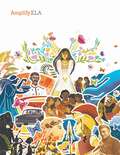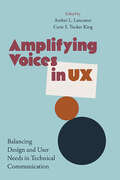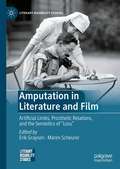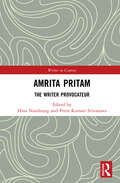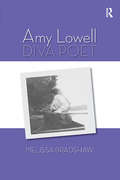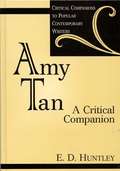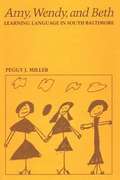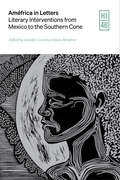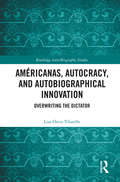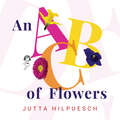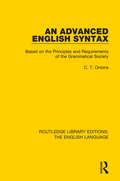- Table View
- List View
Amplify Core Knowledge Language Arts, Kindergarten, Skills 3 Activity Book
by Amplify Core FoundationAmplify Core Knowledge Language Arts, Kindergarten, Skills 3 Activity Book
Amplify Core Knowledge Language Arts, Kindergarten, Skills 4 Activity Book
by Amplify Core FoundationAmplify Core Knowledge Language Arts, Kindergarten, Skills 4 Activity Book
Amplify Core Knowledge Language Arts, Kindergarten, Skills 5 Activity Book
by Amplify Core FoundationAmplify Core Knowledge Language Arts, Kindergarten, Skills 5 Activity Book
Amplify Core Knowledge Language Arts, Kindergarten, Skills 6 Activity Book
by Amplify Core FoundationAmplify Core Knowledge Language Arts, Kindergarten, Skills 6 Activity Book
Amplify Core Knowledge Language Arts, Kindergarten, Skills 6, Kit, Reader
by Amplify Amplify EducationAmplify Core Knowledge Language Arts, Kindergarten, Skills 6, Kit, Reader
Amplify Core Knowledge Language Arts, Kindergarten, Skills 7 Activity Book
by Amplify Core FoundationAmplify Core Knowledge Language Arts, Kindergarten, Skills 7 Activity Book
Amplify Core Knowledge Language Arts, Kindergarten, Skills 7, Seth, Reader
by Amplify Amplify EducationAmplify Core Knowledge Language Arts, Kindergarten, Skills 7, Seth, Reader
Amplify Core Knowledge Language Arts, Kindergarten, Skills 8 Activity Book
by Amplify Core FoundationAmplify Core Knowledge Language Arts, Kindergarten, Skills 8 Activity Book
Amplify Core Knowledge Language Arts, Kindergarten, Skills 8, Sam, Reader
by Amplify Amplify EducationAmplify Core Knowledge Language Arts, Kindergarten, Skills 8, Sam, Reader
Amplify Core Knowledge Language Arts, Kindergarten, Skills 9 Activity Book
by Amplify Core FoundationAmplify Core Knowledge Language Arts, Kindergarten, Skills 9 Activity Book
Amplify Core Knowledge Language Arts, Kindergarten, Skills 9, Zack and Ann, Reader
by Amplify Amplify EducationAmplify Core Knowledge Language Arts, Kindergarten, Skills 9, Zack and Ann, Reader
Amplify Core Knowledge Language Arts, Kindergarten, Skills Picture Reader
by Amplify Core FoundationAmplify Core Knowledge Language Arts, Kindergarten, Skills Picture Reader
Amplify ELA Grade 6
by AmplifyAmplify ELA is a core program designed to respond to the distinct challenges and opportunities faced by middle school students and teachers. The program helps teachers ensure that skills are taught, standards are covered, and the test is prepped—and it does this work in the background so that teachers can spend their time bringing the text to life and providing each student the right instruction at the right time.
Amplifying Voices in UX: Balancing Design and User Needs in Technical Communication (SUNY series, Studies in Technical Communication)
by Amber L. Lancaster; Carie S. Tucker KingThe field of technical and professional communication is young, and research related to it—and specifically usability—is constantly growing. Usability and user-experience researchers are broadening research into studies involving social issues, accessibility, reconciliation, and user advocacy. Amplifying Voices in UX explores the theme of balance in design and UX in three main areas: curriculum design that includes empathy, service learning, and design justice; design and balance for effective medical and health communication; and design to create balance in labor, social, civic, and political movements.
Amputation in Literature and Film: Artificial Limbs, Prosthetic Relations, and the Semiotics of "Loss" (Literary Disability Studies)
by Maren Scheurer Erik GraysonAmputation in Literature and Film: Artificial Limbs, Prosthetic Relations, and the Semiotics of “Loss” explores the many ways in which literature and film have engaged with the subject of amputation. The scholars featured in this volume draw upon a wide variety of texts, both lesser-known and canonical, across historical periods and language traditions to interrogate the intersections of disability studies with social, political, cultural, and philosophical concerns. Whether focusing on ancient texts by Zhuangzi or Ovid, renaissance drama, folktales collected by the Brothers Grimm, novels or silent film, the chapters in this volume highlight the dialectics of “loss” and “gain” in narratives of amputation to encourage critical dialogue and forge an integrated, embodied understanding of experiences of impairment in which mind and body, metaphor and materiality, theory and politics are considered as interrelated and interacting aspects of disability and ability.
Amrita Pritam: The Writer Provocateur (Writer in Context)
by Hina Nandrajog and Prem Kumari SrivastavaAmrita Pritam was a prominent Punjabi poet, novelist, and essayist who captured the realities of everyday life in the India of the early 1900s India and presented the unique voices of the women of the Indian subcontinent. This book offers a comprehensive understanding of the writer’s work by situating it in the context of not just Punjabi literature but Indian literature, while showcasing their continued relevance in contemporary times. With a career spanning over six decades, she Pritam produced over 100 books of poetry, fiction, biographies, essays, a collection of Punjabi folk songs and an autobiography that were all translated into several Indian and foreign languages. This volume includes critical essays on her works as well as a selection of her poems and stories in translation including, ‘A Call to Waris Shah’ (Ajj Aakhaan Waris Shah nu), The Skeleton (Pinjar) and Village No. 36 (Khabarnama Te Chak No. 36) and excerpts from other prominent writings to give readers a glimpse into Pritam’s her rich literary oeuvre as well as her legacy in a post-colonial India which is still grappling with many of the same taboos around gender, national and religious identity and women’s sexuality. It discusses the diversity of themes and socio-cultural realities in her writings works focusing especially on her writings on Punjab, agency of her women protagonists, national and communal identities and the testimonies of the traumas which the cataclysmic 1947 Partition of India brought on women. A writer who consistently subverted the existing social, political and patriarchal structures of her times, both in her life and in her writings, this book encapsulates the relevance of her writing and her voice in our times. Part of the ‘Writer in Context’ series, this book will be useful for scholars and researchers of Indian literature, Hindi literature, Punjabi Literature, English literature, postcolonial studies, cultural studies, global south studies and translation studies.
Amy Lowell, Diva Poet: Diva Poet
by Melissa BradshawIn her reassessment of Amy Lowell as a major figure in the modern American poetry movement, Melissa Bradshaw uses theories of the diva and female celebrity to account for Lowell's extraordinary literary influence in the early twentieth century and her equally extraordinary disappearance from American letters after her death. Recognizing Amy Lowell as a literary diva, Bradshaw shows, accounts for her commitment to her art, her extravagant self-promotion and self-presentation, and her fame, which was of a kind no longer associated with poets. It also explains the devaluation of Lowell's poetry and criticism, since a woman's diva status is always short-lived and the accomplishments of celebrity women are typically dismissed and trivialized. In restoring Lowell to her place within the American poetic renaissance of the nineteen-teens and twenties, Bradshaw also recovers a vibrant moment in popular culture when poetry enjoyed mainstream popularity, audiences packed poetry readings, and readers avidly followed the honors, exploits, and feuds of their favorite poets in the literary columns of daily newspapers. Drawing on a rich array of letters, memoirs, newspapers, and periodicals, but eschewing the biographical interpretations of her poetry that have often characterized criticism on Lowell, Bradshaw gives us an Amy Lowell who could not be further removed from the lonely victim of ill-health and obesity who appears in earlier book-length studies. Amy Lowell as diva poet takes her rightful place as a powerful writer of modernist verse who achieved her personal and professional goals without capitulating to heteronormative ideals of how a woman should act, think, or appear.
Amy Tan: A Critical Companion
by E. D. HuntleyAmy Tan has established a reputation as a major novelist of not only the Asian American experience but the universal experience of family relationships. With the publication of her first novel, The Joy Luck Club in 1988, which touched the hearts of millions of readers, Tan joined the ranks of major contemporary novelists. Adapting her brand of Chinese traditional talk story as a vehicle for exploring the lives of the mothers and daughters at the center of her novels, Tan allows readers to experience the lives of her characters from multiple perspectives in parallel and intersecting narratives. In this first full-length study of her work, E.D. Huntley explores the fictional worlds Tan has created in her three novels, The Joy Luck Club, The Kitchen God's Wife, and The Hundred Secret Senses. A biographical chapter discusses the relationship of Tan with her own mother and its influence and that of her family on the subject matter of her novels. A chapter on Tan's literary heritage places her squarely in the tradition of Asian American literature. Each novel is discussed in a separate chapter and includes sections on plot development, character development, narrative structure, literary devices, setting, and major themes. Each chapter also includes an alternative critical reading from which to approach the novel to help readers see the novel in a different light. A complete bibliography of Tan's writings, writings about her work, and a list of reviews of each novel completes the work. This study is the ideal guide for students and readers of Tan's novels.
Amy, Wendy, and Beth: Learning Language in South Baltimore
by Peggy J. MillerAmy, Wendy, and Beth, the 1980 recipient of the New York Academy of Sciences Edward Sapir Award, is a lively in-depth study of how three young children from an urban working-class community learned language under everyday conditions. It is a sensitive portrayal of the children and their families and offers an innovative approach to the study of language development and social class. A major conclusion of the study is that the linguistic abilities of working-class children are consistent with previous cross-cultural accounts of the development of communicational skills and, as such, lend no support to past claims that children from the lower classes are linguistically deprived. Instead, Amy, Wendy, and Beth emerge as able and enthusiastic language learners; their families, as caring and competent partners in the language socialization process. Sound scholarship and original findings about a hitherto neglected population of children lend special value to this work not only for scholars in psychology, linguistics, and anthropology, but for educators and policymakers as well.
Améfrica in Letters: Literary Interventions from Mexico to the Southern Cone (Hispanic Issues)
by Paulette Ramsay Juan Eduardo Wolf Eliseo Jacob Juan Guillermo Sánchez Martínez Michael Handelsman Gloria Chacón Ángela Castro Isis Barra Costa Diana Rodríguez Quevedo Mamadou BadianeTraditional histories of Black letters in Latin America have delimited their geographic scope to the Caribbean while also omitting intertwined Afro-Indigenous discourses. Inspired by the legacy of Amefrican thinker Lélia Gonzalez, Améfrica in Letters highlights the Black poets, songwriters, novelists, essayists, and bloggers who have created a counter-multiculturalist literary history on the Latin American mainland. To capture a sense of the variety of their contributions, this book spans Mexico, Central America, the Andes, and the Southern Cone—highlighting the transcontinental nature of the legacy of Black writing and its impact beyond national boundaries. The writers examined in the volume engage with regional intellectual frameworks while putting into circulation a demand for a recalibration of the Hispanophone and Lusophone contexts in which they and other Afrodescendants reside.
Américanas, Autocracy, and Autobiographical Innovation: Overwriting the Dictator (Routledge Auto/Biography Studies)
by Lisa Ortiz-VilarelleOverwriting the Dictator is literary study of life writing and dictatorship in Americas. Its focus is women who have attempted to rewrite, or overwrite, discourses of womanhood and nationalism in the dictatorships of their nations of origin. The project covers five 20th century autocratic governments: the totalitarianism of Rafael Trujillo’s regime in the Dominican Republic, the dynasty of the Somoza family in Nicaragua, the charismatic, yet polemical impact of Juan and Eva Perón on the proletariat of Argentina, the controversial rule of Fidel Castro following Cuba’s 1959 revolution, and Augusto Pinochet’s coup d'état that transformed Chile into a police state. Each chapter traces emerging patterns of experimentation with autobiographical form and determines how specific autocratic methods of control suppress certain methods of self-representation and enable others. The book foregrounds ways in which women’s self-representation produces a counter-narrative that critiques and undermines dictatorial power with the depiction of women as self-aware, resisting subjects engaged in repositioning their gendered narratives of national identity.
An ABC of Flowers
by Jutta Hilpuesch"A vividly photographed ABC book with a clean, sophisticated aesthetic." --Publishers WeeklyStep into the garden and learn your ABC's with this colorful feast for the eyes! From asters and daisies to roses and sunflowers, An ABC of Flowers is a colorful burst from the garden that will have little hands eager to grab. Filled with gorgeous photo illustrations, bold colors, and clever line art featuring a miniature-sized girl named Amelie, toddlers will laugh and be mezmerized by the book's vibrant pages.Perfect for the youngest readers learning their ABC's!
An Advanced English Syntax: Based on the Principles and Requirements of the Grammatical Society (Routledge Library Editions: The English Language #20)
by C. T. OnionsThis book, first published in 1970, is the reissue of the sixth edition of C. T. Onions’ standard introductory text-book, based on the principles and requirements of the Grammatical Society. The Introduction is designed to provide a full scheme of sentence analysis. The rest of the book is arranged in two parts: Part I offers a treatment of syntactical phenomena based on the analysis of sentences, while Part II classifies the use of forms. This book will be of interest to students of English language and linguistics.

